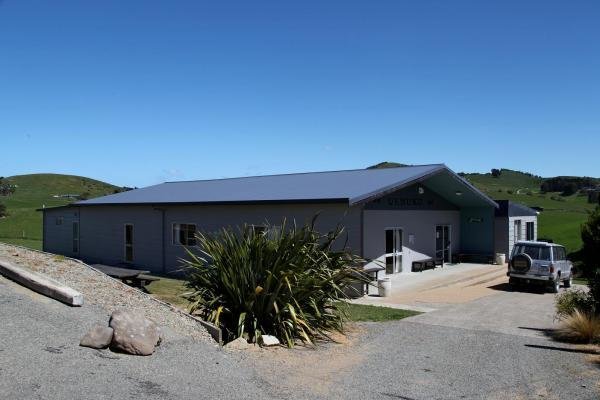Māori data sovereignty
5/5/2021
- Kāi Tahu, Kāti Māmoe, Waitaha
- Nō Moeraki ahau
- One of the original Koha developers
- Works at Catalyst IT
- Former board member Creative Commons Aotearoa NZ
- Former board member National Digital Forum
- chris@bigballofwax.co.nz
- @ranginui on twitter
Ko wai ahau?

Disclaimer
Te Mana Raraunga is a network of people advocating for Māori rights and interests in data. I don't represent them but we are people who share a kaupapa.
I am not speaking on behalf of my employer either.

- Data Sovereignty
- Te Mana Raraunga
- Why it's important
- What can we do?
Agenda

Data sovereignty comes into play when an organisation’s data is stored outside of their country and is subject to the laws of the country in which the data resides.
The ability to exert control over where the data is stored, how it is used, and who it used by.
Data Sovereignty
Narrow definition
My context
Indigenous Data Sovereignty is concerned with the rights of Indigenous peoples to control data derived from and pertaining to them, and their knowledge systems, customs or territories.
Maggie Walter and Michele Suina, ‘Indigenous Data, Indigenous Methodologies and Indigenous Data Sovereignty’, International Journal of Social Research Methodology, 22
Indigenous Data Sovereignty
Māori Data Sovereignty supports a collective sovereign refusal that is both a shutting down of data colonialism, and a simultaneous opening up of an alternative relational approach to data and digital technologies that is grounded in tikanga.
Tahu Kukutai, Donna Cormack, Chris Cormack, 'Not one byte more' Ch 4, Shouting Zeros and Ones , 2020
Māori Data Sovereignty
Te Mana Raraunga
The purpose of Te Mana Raraunga is to enable Māori Data Sovereignty and to advance Māori aspirations for collective and individual wellbeing by:
- Asserting Māori rights and interests in relation to data
- Ensuring data for and about Māori can be safeguarded and protected
- Requiring the quality and integrity of Maori data and its collection
- Advocating for Māori involvement in the governance of data repositories
- Supporting the development of Māori data infrastructure and security systems
- Supporting the development of sustainable Māori digital businesses and innovations
Principles of Māori Data Sovereignty
-
Rangatiratanga
-
Whakapapa
-
Whanaungatanga
-
Kotahitanga
-
Manaakitangi
-
Kaitiakitanga
Authority
Relationships
Obligations
Collective benefit
Reciprocity
Guardianship
Rangatiratanga
1.1 Control
1.2 Jurisdiction
1.3 Self-determination

You can't exert (data) sovereignty unless you control the means of its production.

Photo courtesy of Verenoa Hetet
Many Māori are sceptical that data-driven solutions can work without significant input from people with a Māori worldview at all points in the statistical pipeline, from problem formulation to data collection and analysis.
Caleb Moses - Shouting Zeros and Ones : Chapter 4 : The intergrated data infrastructure
He raru ki tai
The Investment Approach to Justice: Taking Integrated Offender Management to Police, Justice and the wider social sector - Tim Hughes Principal Adviser, Ministry of Justice
These life-course risk models will be built on the Integrated Data Infrastructure at Statistics NZ. This powerful database hosts a very wide range of anonymised information about all New Zealanders, including records about tax, earnings and employment records, health, education, and welfare receipt. We will use factors such as age, and early CYF involvement, to predict future offending and victimisation for the resident population of New Zealand.
Tētahi atu raru ki tai
Individuals in general experience the dispossession of their data, but marginalized persons and groups experience additional ways in which their data is “colonized” and used to further discriminate against them.
(Big) Data and the North-in-South: Australia’s Informational Imperialism and Digital Colonialism
- Monique Mann and Angela Daly
Collectors view the world in a particular way. Before the action of collecting begins, the person has designed 'the pretty', 'the object of desire', 'the resource' in their minds; they have composed collections with missing pieces; they have devised the search and the seeking. Their external world becomes a hunt, a trigger of recognition that shapes and manifests their desires. In this world, indigenous peoples live, being the collected, the named, the classified, the commons, the public domain, the protectors of the desired, the obstacles, the remnants, the fascinating, the reviled, the disappointing, the occupiers - a myriad of projections and illusions.
Cultures of Collecting - Cherryl Smith
How do we combine a kaupapa Māori approach with the rush into the digital/data driven world?
So it encourages us to do this in data science
So we must put stuff in context, not see things as isolated data points
We must understand the whakapapa of the data
And we must be attentive to history
This will make all data science better
Kaupapa Māori is always mindful of context
Power based analysis
Maximise autonomy by keeping data private (mana motuhake)
While maximising control over the state by being able to see the data they are using
Very simplistically
View it through the lens of the power differential, those with the power should be open, those without, not so much.

We are used to asking:
- What do we do with all these data?
- How do we catalogue them?
-
How should we use them?
Less often we consider the questions:
- Should we collect, aggregate, catalogue and exploit these data?
- If so, how?
- What would be ethical means for doing so?
The Good Data Manifesto
Good Data -Edited by Angela Daly, S. Kate Devitt and Monique Mann.
http://networkcultures.org/blog/publication/tod-29-good-data/
- Te Mana Rarauranga
- US Indigenous Data Sovereignty Network (USIDSN)
- OCAP® (Ownership, Control, Access, Possession)
- Maiam nayri Wingara
Organisations working on Data sovereignty
Questions?
